Top 10 Composable Commerce Consultants with AWS Expertise for B2B and Retail
August 25, 2025

The shift away from monolithic architecture is no longer a question of if. It’s a matter of how fast you can move. You’re likely already weighing options to restructure your current stack into something more modular, faster to deploy, and easier to scale across regions. That’s where composable commerce built on AWS comes in.
But execution isn’t about theory. It depends on how well your partners understand real-world constraints, from backend performance to seamless integration with legacy systems.
In this article, you’ll compare top consultants, see where they differ, and get clarity on who’s best equipped to support your AWS roadmap. Let’s start by defining what these services actually involve.
What Are Composable Commerce Consulting Services on AWS?
Composable commerce consulting services on AWS help you build and manage a modular architecture using MACH principles. MACH is an acronym for microservices architecture, API-first approach, cloud-native, and headless.
In practice, these consulting services help you with technical planning, setting up APIs, provisioning cloud-native infrastructure, and tuning performance. Consultants also help you integrate services like order management systems, CMS, or payment gateways through scalable APIs.
With benefits like faster rollouts and cleaner integrations, it’s no surprise that composable commerce adoption is accelerating.
In fact, a Composable Commerce Trends 2025 report by Alokai shows that composable commerce has reached a 41.67% adoption rate, which proves it’s now a standard move.
When these services are implemented well, you get faster rollouts, cleaner integrations, and freedom from outdated platform constraints. If you like to learn visually, here’s an interesting YouTube video from John Williams, a CTO with over 25 years of experience in the tech industry:
Now, let’s look at why you need this now.
Why Do You Need Composable Commerce Consulting on AWS
You need composable commerce consulting on AWS to support a scalable setup that adapts to growth and shifting priorities. As a CTO or digital leader, you’re expected to deliver agility without increasing overhead, and that’s hard to do on monolithic platforms.
These are the advantages that matter most:
- Build flexible, best-of-breed commerce ecosystems: Modular builds let you integrate tools across the eCommerce ecosystem without rewriting core functions. According to an Amazon article written by Justin Swagler and Harry Chemko, that flexibility pays off because 26% of companies using composable commerce reported faster integration with third-party tools.
- Scale services globally with AWS-native tools and infrastructure: AWS offers global reach through services like CloudFront and Lambda. No surprise that over 70% of MACH Alliance members now build their commerce stacks on AWS.
- Accelerate innovation with modular, API-driven architectures: Modular builds let you update services faster and test changes in isolation.
- Reduce operational complexity through automation and CI/CD: Automated pipelines cut delays from manual QA and long release cycles.
- Improve security, governance, and observability at scale: AWS tools like CloudWatch and IAM policies help you manage risk and performance.
- Enable faster time-to-market for new features and integrations: Composable setups let you release features faster with fewer bottlenecks. Alokai reports a 27% speed boost for early adopters.
- Future-proof your stack against vendor lock-in and monolith limitations: You gain more flexibility to adapt, scale, and integrate over time. Swagler and Chemko found 26% of teams improved response time after ditching legacy platforms.
Pro tip: Composable commerce is one part of the puzzle. Here’s how top retailers tie architecture to broader transformation goals.
Next, let’s look at the consultants who specialize in delivering these results.
Composable Commerce Consultants on AWS
If you’re looking to adopt or expand a composable commerce architecture on AWS, the right partner can accelerate your progress. These are the top consultants helping teams build with confidence.
1. Nova Cloud
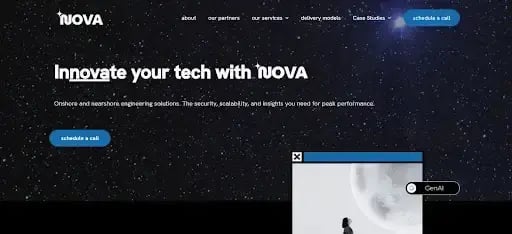
Nova Cloud is a specialized AWS-native consultancy focused on MACH-based commerce architecture. We support your full project lifecycle, from discovery through microservices, APIs, frontend builds, and cloud ops.
What sets Nova apart is our hands-on execution across the stack. This means serverless logic via AWS Lambda, headless builds with Next.js or Vue Storefront, and infrastructure with ECS, CloudWatch, and more.
Our teams are certified in AWS and work on retail, CPG, and DTC rollouts with clear sprints and fast feedback loops. If you’re planning to migrate from Salesforce Commerce Cloud or a similar monolith, Nova offers phased migrations, microservice decomposition, and MVP-first go-lives.
Key features:
- MACH-based system design with modular, API-first builds.
- Cloud provisioning and DevOps with AWS-native tooling.
- Full-stack delivery, including frontend and backend microservices.
- Nearshore agile teams for time-zone aligned collaboration.
- AWS Retail Competency with certified engineering staff.
Pros:
- Strong AWS cloud and commerce engineering expertise.
- Reliable delivery with agile processes and CI/CD pipelines.
- Competitive pricing with enterprise-grade output.
Con:
- Requires close collaboration and planning, unlike plug-and-play tools.
Website: novacloud.io
Pricing: Custom quote.
2. Publicis Sapient

Publicis Sapient offers a MACH-based Composable Commerce Accelerator through the AWS Marketplace, designed to help large retailers break apart monolithic platforms. The firm supports full digital transformation with guidance from tech assessments to architecture and launch.
Its pre-built components (like a headless storefront) and vendor partnerships (including VTEX, Contentstack, and Cloudinary) allow you to move quickly. That said, the company’s enterprise scope and scale may create gaps for mid-sized teams looking for hands-on, flexible delivery.
Key features:
- MACH-ready toolkit available on AWS Marketplace for faster rollout.
- Migration strategy with legacy audits and guided replatforming.
- Integrates key ISVs across commerce, CMS, and UX tools.
- Base UI kit provided for headless commerce storefronts.
- Follows MACH standards and AWS implementation best practices.
Pros:
- Strong enterprise transformation record.
- Solid AWS certifications and MACH focus.
- Deep experience with ISV integrations.
Cons:
- Possible higher costs, not suited for mid-market companies.
- The global delivery model may limit hands-on support.
- Frequent team rotations can slow continuity.
Website: publicissapient.com
Pricing: Custom quote.
3. Valtech

Valtech built “LEAP,” a composable commerce accelerator developed with commercetools and tested with brands like Mars, Inc. It’s designed for multi-brand retailers needing fast rollout, shared services, and multi-region support.
LEAP runs on AWS and is available through AWS Marketplace to help teams bypass complex procurement. It comes pre-integrated with MACH technologies like Contentful and includes a front-end starter kit.
Valtech’s differentiator lies in scaling commerce across brands and geographies under a single architecture. With a global workforce and digital engineering teams, Valtech offers delivery muscle but caters mainly to large enterprises.
Key features:
- Composable LEAP accelerator supports D2C and multi-brand operations.
- AWS Marketplace listing enables fast procurement and onboarding.
- Pre-integrated stack with commercetools, Contentful, and more.
- Supports multi-region stores with localized UX and compliance.
- Global delivery model enables enterprise-scale custom builds.
Pros:
- Well-known for strong enterprise project management.
- Broad experience across commerce and digital experience platforms.
- Access to large teams and specialized skill sets globally.
Cons:
- Large minimum project size, not ideal for smaller teams.
- Delivery consistency can drop during team transitions.
- Not optimized for fast-moving mid-market implementations.
Website: valtech.com
Pricing: Custom quote.
4. Elastic Path
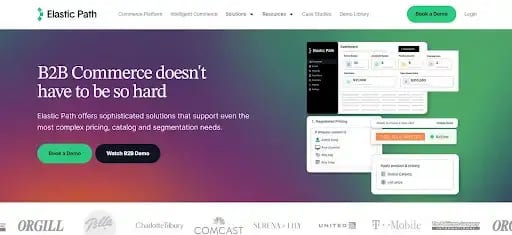
Elastic Path is a SaaS-based headless commerce provider that delivers a composable, MACH-aligned platform through AWS Marketplace. It’s known for early leadership in modular commerce and tools like Composer, a no-code integration hub, and Composable Frontend, a pre-built UI kit.
The company helps teams orchestrate APIs, services, and storefronts with fewer integration risks. It supports high-scale brands through multi-model support like B2B2C and multi-brand commerce.
However, the platform requires skilled developers for implementation and ongoing operations. This makes it less approachable for non-technical teams or companies looking for plug-and-play simplicity.
Key features:
- Composable commerce platform built on cloud-native, API-first architecture.
- AWS Marketplace solution simplifies licensing and onboarding.
- Composer integration tool offers pre-built connectors for major services.
- Composable frontend delivers modular, open-source storefront components.
- Proven performance with brands like T-Mobile and Tesla.
Pros:
- API-first architecture enables rapid development and scalability.
- High customization potential through Flows and Observables.
- Enterprise-grade reliability.
Cons:
- Steep learning curve for business users and non-developers.
- Some features require manual configuration or still lack event support.
- The setup and upgrades demand DevOps capacity and planning.
Website: elasticpath.com
Pricing: Starts at $2,200/month (base plan).
5. Dinarys
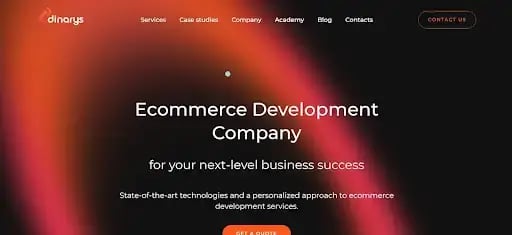
Dinarys is an eCommerce engineering company that delivers full-scope composable commerce solutions on AWS. Its teams specialize in API-first development, legacy modernization, and multi-system integration.
The company supports various commerce models, including B2B and marketplaces, and builds cloud-native solutions that scale automatically under heavy traffic. Clients usually bring Dinarys in to replace rigid monoliths or connect siloed platforms.
With DevOps support, containerized architecture, and CI/CD pipelines, Dinarys makes composable commerce infrastructure easier to manage post-launch. Its mid-size team is best suited for mid-market and growth-stage enterprises looking for flexibility and speed, rather than global scale.
Key features:
- End-to-end services, including strategy, build, and migration.
- Cloud-native deployments using auto-scaling and containers.
- API-first integration of third-party and legacy systems.
- Experience in B2B, B2C, and multi-vendor commerce setups.
- Full DevOps setup with CI/CD and AWS monitoring tools.
Pros:
- Competitive pricing with ROI.
- Responsive communication and on-time delivery.
- Reliable technical execution and platform quality.
Cons:
- Early project phases may lack clear documentation.
- Some language/cultural gaps in offshore collaboration.
- Mid-sized team may not scale quickly for global rollouts.
Website: dinarys.com
Pricing: Custom quote.
6. Grid Dynamics

Grid Dynamics offers MACH accelerators built to speed up composable commerce on AWS. Its Starter Kit provides reference architecture, microservices templates, and pre-built connectors for services like Contentstack, Algolia, and Stripe. The kit also includes a headless storefront and deployment scripts.
The firm focuses on fast rollout and iterative deployment using agile methods. Its delivery model leans heavily on staff augmentation. This means you’ll manage projects internally while its engineers support execution.
That works well if you have strong internal leadership and need to scale quickly. But if you’re looking for a fully managed service with strategic input, this model may not match your needs.
Key features:
- Starter kit with microservices and deployment templates.
- Pre-built connectors for CMS, OMS, and payment providers.
- Storefront accelerator for building headless UIs.
- AWS-native extensions for AI, fraud, and analytics.
- Agile rollouts supported by free workshops.
Pros:
- Engineering talent across tech stacks.
- Transparent communication and feedback loops.
- Flexible scale through staff augmentation.
Cons:
- Slightly lower cost satisfaction among some clients.
- Requires in-house leadership for project direction.
Website: griddynamics.com
Pricing: Custom quote.
7. McKenna Consultants
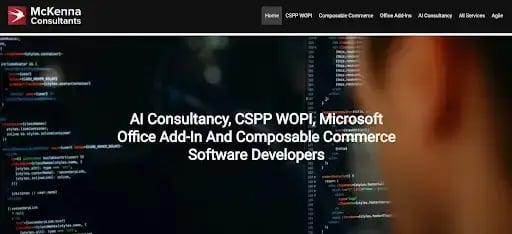
McKenna Consultants is a boutique UK-based firm focused on cloud-native, composable builds for complex B2B commerce. Its strength lies in modernizing legacy ERP or PIM systems with API-first architectures that avoid full rewrites.
The company usually implements Elastic Path as the commerce engine, building around it with AWS-native components and custom services. This makes its solutions practical for enterprises with existing infrastructure that can’t be replaced easily.
McKenna Consultants delivers hands-on service across consulting, development, and DevOps. However, its small team size and UK-only location can limit scalability or real-time global support.
Key features:
- Specializes in complex B2B commerce builds.
- Integrates legacy ERP/CRM into headless setups.
- Uses Elastic Path as the core commerce engine.
- Delivers AWS-native microservices and CI/CD pipelines.
- Provides full-cycle architecture, UX, QA, and cloud ops.
Pros:
- Personalized development with agile delivery.
- Client communication and long-term focus.
- Delivers under tight project deadlines.
Cons:
- Limited capacity due to a very small team.
- UK-based with no global footprint.
- AWS experience is not as prominently proven.
Website: mckennaconsultants.com
Pricing: Custom quote.
8. Cloudflight
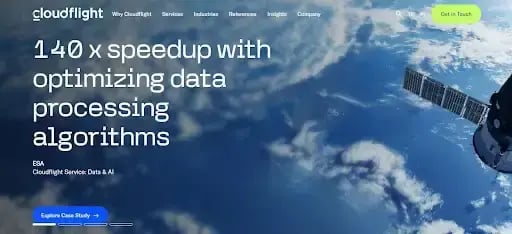
Cloudflight is a European consultancy focused on building composable commerce solutions on AWS with a foundation in legacy integration. It tailors each build using modern frameworks like commercetools, VTEX, or SAP Spartacus and usually working with complex B2B environments.
One example includes helping Mirka implement a scalable architecture using SAP Commerce Cloud, a headless frontend, and deep ERP integration, all deployed on AWS. Cloudflight is known for strong solution design and iterative delivery, but operates at a higher price point.
It also shifts team members mid-project, which can impact consistency. While its commerce and cloud expertise are okay, you’ll want clear agreements on staffing and integration plans from the outset.
Key features:
- Offers full-cycle consulting and AWS deployment.
- Skilled in commerce tools, VTEX, SAP Spartacus.
- ERP, PIM, and pricing logic integration.
- Handles complex B2B architectures and dealer portals.
- Supports AI-based personalization and analytics.
Pros:
- Commerce experience across multiple platforms.
- Delivers clean, user-friendly frontends.
- Works in Agile sprints with good collaboration.
Cons:
- Team changes can disrupt project momentum.
- Some integration gaps in complex scenarios.
Website: cloudflight.io/en
Pricing: Custom quote.
9. EPAM
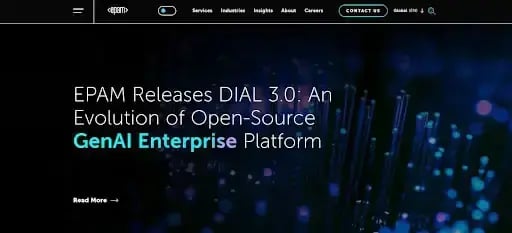
EPAM is a global consultancy offering composable commerce services built for scale. Its RACE accelerator helps you deploy a new D2C channel on AWS in just eight weeks, using commerce tools and Contentful as the core stack.
The kit includes infrastructure templates, CI/CD pipelines, and out-of-the-box integrations for ERP, payments, and more. This means you can launch faster while reducing upfront complexity.
EPAM’s strength lies in running large-scale programs that start small and expand. However, its global delivery model can lead to time zone friction. For companies needing rapid delivery, complex system orchestration, and global rollout, EPAM brings the scale but not without tradeoffs in communication and cost.
Key features:
- RACE accelerator for fast composable setup.
- commercetools and Contentful stack deployed on AWS.
- Built-in ERP and third-party integrations.
- Pre-configured CI/CD and cloud infra templates.
- Suits multi-region, compliance-heavy projects.
Pros:
- Handles complex, global-scale projects.
- Delivers end-to-end consulting and cloud services.
- Engineering quality and governance.
Cons:
- Communication gaps from the time zone spread.
- Risk of team changes during delivery.
Website: epam.com
Pricing: Custom quote.
10. Dept Agency
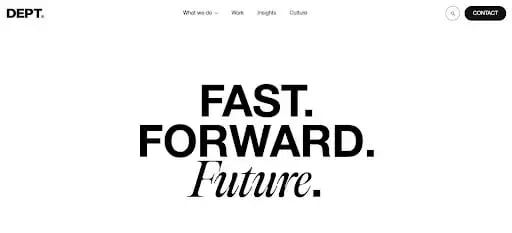
Dept is a digital agency with MACH Alliance membership and strong composable commerce capabilities on AWS. Its proprietary DASH framework offers ready-to-use frontend components and templates that help you accelerate storefront development.
Dept stands out by combining infrastructure expertise with creative UI execution. The company supported over 30 MACH migrations and is a recognized AWS partner. However, delivery quality has varied depending on team composition and project scope.
Some clients report significant delays tied to internal coordination challenges. If you’re prioritizing design-heavy experiences backed by composable architecture, Dept offers depth, but you’ll want to plan project oversight carefully.
Key features:
- MACH-certified agency with migration experience.
- DASH framework for pre-built storefront components.
- Full AWS cloud deployment and operations support.
- Combines frontend design with backend commerce.
- Modular rollout plans for phased replatforming.
Pros:
- Technical and creative capabilities.
- Responsive, collaborative communication style.
- Focused on client success with repeat partnerships.
Cons:
- Reports of project delays.
- Quality issues were noted by some online reviews.
- Delivery consistency may vary.
Website: deptagency.com/en-uki/
Pricing: Custom quote.
How to Choose a Composable Commerce Consultant
Choosing the right consulting partner shapes the pace, flexibility, and long-term success of your composable commerce platform. You need technical alignment but also a partner who knows how to work within your team’s structure, timeline, and strategic goals.
These are the key factors to evaluate before making a decision:
- Depth in MACH and AWS-native execution: Check their portfolio for live builds that use AWS services like Lambda, API Gateway, or Fargate to implement MACH patterns, not just prototypes or demos.
- Modular system expertise: Look for experience breaking down large commerce stacks into smaller packaged business capabilities built with independent microservices and an API layer.
- Proven DevOps maturity: Ask how they handle automated pipelines. Mature partners integrate GitOps, Terraform, or CI tools like CircleCI for smooth deployments.
- Accelerators and frameworks: Prioritize teams with pre-built code templates, migration toolkits, or reusable components that cut development time.
- Stack compatibility testing: Make sure they’ve handled similar e-commerce platforms or third-party tool integrations like PIMs or payment gateways.
- Ongoing monitoring and tuning: Reliable partners will set up dashboards, handle cost optimizations, and apply updates post-launch.
- Timezone and team fit: Daily syncs matter. Teams in aligned zones respond faster, which reduces blockers during go-live sprints.
Pro tip: Planning a phased migration from your monolith? This guide outlines AWS-native benefits retailers are already using to cut costs and scale faster.
Choosing the Right Composable Commerce Partner for Your AWS Success
Building a modular stack on AWS is a strategy to move faster, reduce risk, and compete at scale. That’s why selecting a consultant with proven MACH experience, cloud-native skill sets, and hands-on delivery models matters.
Nova brings all of that together with certified AWS engineers, nearshore collaboration, and a clear path from planning to performance. Whether you’re migrating from a legacy system or launching new services, Nova helps you get results with fewer delays and better visibility.
To move forward with confidence, schedule a call with Nova for composable commerce consulting that fits how you build.
FAQ
How does MACH-based commerce differ from traditional monolithic platforms?
MACH‑based commerce breaks systems into discrete, independent services (microservices, APIs, headless frontends), while monoliths bundle all commerce logic together. That separation boosts agility and reduces deployment risk across functions like content management, checkout, and inventory services.
Can AWS infrastructure alone support a composable commerce ecosystem?
AWS infrastructure alone gives you scalable compute, data pipeline tools, and serverless architecture. But to succeed at composable commerce, you still need connectors, APIs, front‑end frameworks, and commerce logic, so you’ll need partners or tooling on top of AWS.
What AWS services are typically used in composable commerce stacks?
Typical stacks include AWS Lambda for serverless functions, API Gateway for routing, DynamoDB or RDS for storage, CloudFront for global delivery, Cognito for authentication and authorization, and CloudWatch for observability.
How long does it take to migrate from legacy to composable commerce on AWS?
Migration timelines vary by scope. It can take as little as a few weeks for an MVP slice. Full replatforming usually takes 6-12 months, depending on team bandwidth, legacy complexity, and phased microservice deployment.
What’s the cost implication of running modular, microservice-based architectures on AWS?
Microservices can increase operational overhead and incur data‑flow, API Gateway, and Lambda costs. That said, you can optimize costs by right‑sizing resources, leveraging serverless scaling, and removing unused services post-launch.
Comments